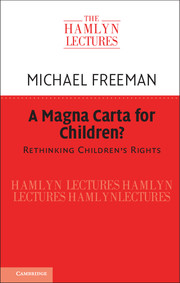Book contents
- A Magna Carta for Children?
- A Magna Carta for Children?
- Copyright page
- Dedication
- Contents
- The Hamlyn Trust
- The Hamlyn Lectures
- Preface
- Acknowledgements
- Prelude
- Part I Is it Wrong to Think of Children as Human Beings?
- 1 Are Children Human?
- 2 Interlude: Taking A Deep Breath
- Part II Even Lawyers Were Children Once
- Part III A Magna Carta for Children
- Appendices
- Bibliography
- Index
2 - Interlude: Taking A Deep Breath
from Part I - Is it Wrong to Think of Children as Human Beings?
Published online by Cambridge University Press: 18 September 2020
- A Magna Carta for Children?
- A Magna Carta for Children?
- Copyright page
- Dedication
- Contents
- The Hamlyn Trust
- The Hamlyn Lectures
- Preface
- Acknowledgements
- Prelude
- Part I Is it Wrong to Think of Children as Human Beings?
- 1 Are Children Human?
- 2 Interlude: Taking A Deep Breath
- Part II Even Lawyers Were Children Once
- Part III A Magna Carta for Children
- Appendices
- Bibliography
- Index
Summary
Children’s rights are situated within the culture of modernity, in which the emphasis is on the universal and upon objective knowledge (Hartas, 2008). The ethical foundation is that individuals are atomistic units and require an authority to establish objective rules to govern their lives. When children’s rights are seen, as the dominant tendency is to do, as a universal code, most obviously as in the CRC, it has attracted criticism for relying on a deterministic understanding of who the child is (Gould, 2004). Determinism has played a formative role in the constructions of childhood.
- Type
- Chapter
- Information
- A Magna Carta for Children?Rethinking Children's Rights, pp. 70 - 82Publisher: Cambridge University PressPrint publication year: 2020

